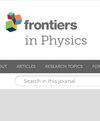超短脉冲激光作用下随时间变化的热传导的数值分析和实验验证
IF 1.9
3区 物理与天体物理
Q2 PHYSICS, MULTIDISCIPLINARY
引用次数: 0
摘要
热作用是激光加工中的一个关键过程。经典的傅立叶热传导理论假定热传播速度为无限,通常用于描述稳态和轻微瞬态热过程。然而,在超短脉冲激光器(如皮秒和飞秒持续时间的激光器)的影响下,材料内部的热传播速度是有限的,偏离了傅里叶定律。本文通过将傅里叶定律与实际脉冲激光输出功率密度的高斯分布和材料的光学吸收特性相结合,探讨了材料在超短脉冲激光照射下热传导的独特特性。它引入了一个时间变量,建立了一个随时间变化的热传导方程。该方程采用差分算法进行数值分析。在此基础上,对使用 1064 nm ps 激光加工牙科硬组织进行了模拟和实验研究。结果表明,实验加工深度略大于模拟结果,这可能是由于加工过程中对牙科硬组织的损伤和热机械效应造成的。该结果为超短脉冲激光加工技术中激光参数的调整提供了技术参考。本文章由计算机程序翻译,如有差异,请以英文原文为准。
Numerical analysis and experimental verification of time-dependent heat conduction under the action of ultra-short pulse laser
Thermal action is a crucial process in laser processing. The classical Fourier heat conduction theory, which assumes an infinite speed of heat propagation, is commonly applied to describe steady-state and mild transient thermal processes. However, under the influence of ultra-short pulse lasers, such as those with picosecond and femtosecond durations, the heat propagation speed within the material is finite and deviates from Fourier’s law. This article addresses the unique characteristics of heat conduction in materials subjected to ultra-short pulse laser exposure by integrating Fourier’s law with the Gaussian distribution of the actual pulse laser output power density and the material’s optical absorption properties. It introduces a time variable to establish a time-dependent heat conduction equation. This equation is numerically analyzed using a difference algorithm. Based on this, simulation and experimental studies on the processing of dental hard tissues with a 1064 nm ps laser were conducted. The results show that the experimental processing depths were slightly larger than the simulation results, which may be due to damage to the dental hard tissues and the thermomechanical effects during processing. The results offer a technical reference for adjusting laser parameters in the ultra-short pulse laser processing technique.
求助全文
通过发布文献求助,成功后即可免费获取论文全文。
去求助
来源期刊

Frontiers in Physics
Mathematics-Mathematical Physics
CiteScore
4.50
自引率
6.50%
发文量
1215
审稿时长
12 weeks
期刊介绍:
Frontiers in Physics publishes rigorously peer-reviewed research across the entire field, from experimental, to computational and theoretical physics. This multidisciplinary open-access journal is at the forefront of disseminating and communicating scientific knowledge and impactful discoveries to researchers, academics, engineers and the public worldwide.
 求助内容:
求助内容: 应助结果提醒方式:
应助结果提醒方式:


